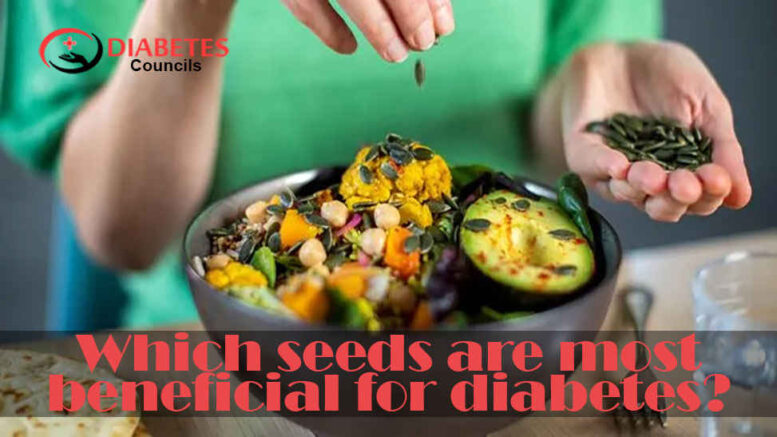Seeds are a quick and simple way to incorporate healthy fats, protein, fiber, or antioxidants into your next meal or snack. According to study, seeds can have a number of positive health effects when paired with a balanced diet. These benefits include lowering blood pressure, lowering bad cholesterol (LDL), and raising good cholesterol (HDL). See which seeds are ideal for diabetics and how to include them in your diet.
What are the many kinds of seeds and how can they benefit your health?
Here are a few alternatives for nutrient-dense seeds to consider:
Chia seeds: The Salvia hispanica plant, native to Central America, is the source of these tiny black or white seeds. Chia seeds are rich in antioxidants, fiber, and protein in addition to being a great source of vitamins and minerals. You can consume them whole or ground.
Flaxseeds: Also referred to as linseeds, these seeds have a texture akin to sunflower seeds and a nutty flavor. Flaxseeds are rich in antioxidants, fiber, and heart-healthy omega-3 fats. Since flaxseeds’ fibrous outer shell makes them difficult to digest, it is ideal to consume them crushed.
Hemp seeds: Packed with protein, minerals, and vitamin E, hemp seeds are obtained from the cannabis sativa plant. The seeds are high in important fatty acids and have very little THC from cannabis. You can eat raw, cooked, or roasted hemp seeds. Hemp seed oil is a nutritious choice for both cooking and salad dressing.
Pumpkin seeds: A well-liked seed kind, pumpkin seeds are rich in omega-6, monounsaturated, and phosphorous fats. You may eat them with or without their shells, but if you want to cut back on sodium, go for natural, unsalted versions.
Sesame seeds: Sesame seeds include calcium, copper, iron, magnesium, manganese, selenium, thiamine, and zine, even in little amounts. Sesame seeds can be added to main courses and nutritious desserts in addition to being used to make tahini and sesame oil.
Sunflower seeds: These seeds lessen inflammation and are a rich source of monounsaturated and omega-6 fats. They are a great source of Vitamin E and can be eaten with or without their shells, just like pumpkin seeds. It is optimal to consume them without any additional salt.
Read Also: All things related to diabetes and carbohydrates
What effect do seeds have on blood sugar levels?
Due to their high fiber content and low carb content, seeds are a useful food for controlling blood sugar levels.
The carbohydrate, fiber, and calorie content of common seeds are shown in the following chart.
| Seeds | Carbs | Fibre | Calories |
|---|---|---|---|
| Chia | 12g | 10g | 138 calories |
| Flax | 4g | 3.8g | 74 calories |
| Hemp | 2g | 1g | 90 calories |
| Pumpkin | 4g | 2g | 36 calories |
| Sesame | 4g | 2g | 104 calories |
| Sunflower | 4g | 2g | 102 calories |
Two tablespoons is the serving size.
How are seeds used?
Seeds are incredibly adaptable. Add them to smoothies and soups, or sprinkle them over salads, yogurt, and cereal. They are also excellent added to homemade breads and muffins. Particularly chia is a fantastic addition to overnight oats and puddings because of its rapid absorption of moisture.
You can add a handful of seeds to fresh fruit for a filling snack, or use them in homemade granola and trail mix. Try blending hemp, pumpkin, or sunflower seeds in your food processor until they become a creamy butter to make your own.
Alternatively, you may purchase numerous readymade varieties at the grocery store or prepare your own tahini by processing sesame seeds and a small amount of oil in a food processor until smooth. For example, tahini can be used as a dressing for a grain bowl or as a sauce for roasted carrots.
Seeds should be kept in a dark, cool area at room temperature, or in the refrigerator if they are ground flaxseed, in a container that is firmly sealed. Remember that even with all of their benefits, seeds are high in fat and calories, so eat them in moderation—two tablespoons to a quarter cup three times a week, maximum.
Given that seeds have long been a staple diet, we ought to take advantage of all the health advantages they offer. When creating nutritious meal plans for your diabetic diet, one simple method to up the nutritional value is to include seeds. A diet high in seeds may also improve your blood sugar regulation.


Be the first to comment on "Which seeds are most beneficial for diabetes?"